|
|
|
Sort Order |
|
|
|
Items / Page
|
|
|
|
|
|
|
| Srl | Item |
| 1 |
ID:
133821
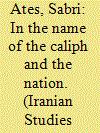

|
|
|
|
|
| Publication |
2014.
|
| Summary/Abstract |
Under the leadership of Sheikh Ubeidullah of Nehri, in the last months of 1880 tens of thousands of Iranian and Ottoman Kurds marched on northwestern Iran and temporarily took control of several cities. This movement, coupled with the response of the Iranian army, resulted in great violence and displacement. Despite its failure, in the limited literature on Kurds this revolt is seen as the birth of Kurdish nationalism. Using extensive and underutilized historical documents-including official correspondence from Iranian and Ottoman authorities as well as British consuls, and day-to-day reports and memoirs from American missionaries active in the region-this project suggests that Sultan Abdulhamid's (Sunni) pan-Islamist agenda, Shi'i-Sunni tensions, the rise of Armenian nationalism, and missionary activities in the region also played significant roles in the formation of this movement.
|
|
|
|
|
|
|
|
|
|
|
|
|
|
|
|
| 2 |
ID:
163311
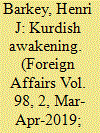

|
|
|
|
|
| Summary/Abstract |
We’ve been fighting for a long time in Syria,” said U.S. President Donald Trump in the last days of 2018. “Now it’s time for our troops to come back home.” The president’s surprise call for a rapid withdrawal of the nearly 2,000 U.S. troops stationed in Syria drew widespread criticism from members of the U.S. foreign policy establishment. But it came as an even greater shock to the United States’ main partner in the fight against the Islamic State (or ISIS), the Syrian Kurds. For weeks prior to the announcement, Turkish President Recep Tayyip Erdogan had been threatening to invade areas of northern Syria controlled by Kurdish militants. The only thing stopping him was the presence of U.S. troops. Removing them would leave the Kurds deeply exposed. “If [the Americans] will leave,” warned one Syrian Kurd, “we will curse them as traitors.”
|
|
|
|
|
|
|
|
|
|
|
|
|
|
|
|
| 3 |
ID:
121524
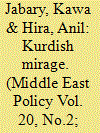

|
|
|
| 4 |
ID:
076749
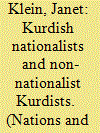

|
|
|
|
|
| Publication |
2007.
|
| Summary/Abstract |
Recent scholarship has begun to nuance the idea of Ottoman decline, but few works have attempted to see nationalism outside of the dominant decline paradigm. By addressing the emergence of Kurdish nationalism in the late Ottoman period, this paper questions the idea that imperial disintegration and nationalism were inherently intertwined; and challenges not only the mutually causal relationship that has been emphasised in literature to date, but also the shape that the 'nationalist movement' took. Using archival sources, the Kurdish-Ottoman press, travel literature and secondary sources in various languages, the present paper will illustrate how the so-called Kurdish nationalist movement' was actually several different movements, each with a differing vision of the political entity its participants hoped to create or protect through their activities. The idea of Kurdish nationalism, or Kurdism, may have been present in the minds of these activists, but the notion of what it meant was by no means uniform. Different groups imbued the concept with their own meanings and agendas. This study demonstrates that most 'nationalists' among the Kurds continued to envision themselves as members of the multi-national Ottoman state, the temptingly powerful rise of nationalism in their day notwithstanding. The suggestion has important implications for students and scholars of nationalist movements among other non-dominant groups, not only in the Ottoman Empire but in contemporaneous empires such as the Habsburg, and in later states like Iraq, Rwanda and Sudan. The present study further questions the received wisdom that multi-ethnic entities are a recipe for disaster. It proposes that a joint effort to rethink what we know about minority nationalism may involve not only a reconceptualisation of the very terms we use, but perhaps an accompanying shift in approach too.
|
|
|
|
|
|
|
|
|
|
|
|
|
|
|
|
| 5 |
ID:
028340


|
|
|
|
|
| Edition |
1st ed.
|
| Publication |
London, Faber and Faber, 1973.
|
| Description |
196p.hbk
|
| Standard Number |
057109905X
|
|
|
|
|
|
|
|
|
|
|
|
Copies: C:1/I:0,R:0,Q:0
Circulation
| Accession# | Call# | Current Location | Status | Policy | Location |
| 014547 | 956.7043/OBA 014547 | Main | On Shelf | General | |
|
|
|
|
| 6 |
ID:
173200
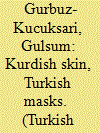

|
|
|
|
|
| Summary/Abstract |
Evdirrehîm Hekarî is mostly known for his Kurdish nationalist writings and activism at the end of the Ottoman Empire. He continued to be a voice for the Kurdish nation during the Republican period in his private writings, while he identified as a Muslim Turk in his publications. Hekarî’s complete rejection of secular Turkishness existed alongside his submission to Turkish Islamic discourse. His split identity and paradoxes are analyzed using Frantz Fanon’s study of the colonized man and his inconsistencies in his fight with the colonizer. In examining Hekarî’s inner inconsistencies, the article also benefits from Partha Chatterjee’s study of the contradictions of nationalist thought in its battle with colonialist power.
|
|
|
|
|
|
|
|
|
|
|
|
|
|
|
|
| 7 |
ID:
161147


|
|
|
|
|
| Summary/Abstract |
Over the course of the last decade and a half the Kurdistan Workers’ Party (PKK) has transformed its ideological orientation in accord with the changing outlook of its imprisoned leader, Abdullah Öcalan. It has discarded its erstwhile Marxist-Leninist ideology for the anarchist-inspired thought of the American political theorist Murray Bookchin. Yet, the PKK’s new theorist of choice may not be an entirely suitable one. Bookchin was a rabid anti-nationalist, and this paper argues that, even after having appropriated Bookchin, the PKK has been unable to chart a non-nationalist course. Scholars of the Kurdish question have so far let Bookchin’s seeming unsuitability go unnoticed. This is likely because Bookchin’s thought is not well known. This paper offers an overview of Bookchin’s thought, and in doing so, hopefully contributes to making Bookchin better understood.
|
|
|
|
|
|
|
|
|
|
|
|
|
|
|
|
|
|
|
|
|